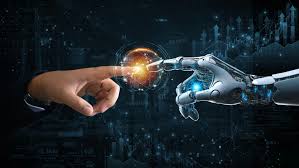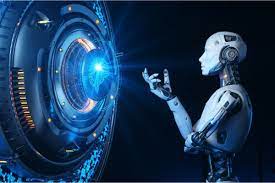The Impact of Technology on Modern Society
Technology has become an integral part of our daily lives, influencing how we communicate, work, and entertain ourselves. Its rapid advancement continues to reshape industries and redefine the way humans interact with the world.
Communication Revolution
One of the most significant impacts of technology is in the realm of communication. The advent of smartphones and the internet has made it possible for people to connect instantly across the globe. Social media platforms have further transformed how individuals share information and maintain relationships, breaking down geographical barriers.
Transforming Industries
Technology has revolutionised various industries by enhancing efficiency and productivity. In healthcare, digital tools such as electronic health records and telemedicine have improved patient care. The financial sector has seen a shift towards digital banking and cryptocurrencies, while automation and AI are reshaping manufacturing processes.
Education in a Digital Age
The education sector has also felt the impact of technology through e-learning platforms that provide access to a wealth of resources beyond traditional classroom settings. Students can now learn at their own pace, making education more accessible to diverse populations worldwide.
Challenges and Considerations
Despite its many benefits, technology also presents challenges such as privacy concerns, cybersecurity threats, and job displacement due to automation. It is crucial for policymakers to address these issues while fostering technological innovation responsibly.
The Future Outlook
The future promises even more technological advancements with developments in artificial intelligence, quantum computing, and biotechnology on the horizon. As society continues to adapt to these changes, it is essential to balance innovation with ethical considerations to ensure technology serves humanity’s best interests.
In conclusion, technology’s impact on modern society is profound and multifaceted. While it offers numerous opportunities for growth and improvement across various sectors, it also requires careful management to mitigate potential risks.
Exploring Technology: Key Questions and Insights on Communication, Education, Healthcare, and Privacy
- What is technology?
- How has technology changed the way we communicate?
- What are the latest technological advancements?
- How does technology impact education?
- What are the benefits of technology in healthcare?
- What are the potential risks of excessive technology use?
- How can businesses leverage technology for growth?
- What role does artificial intelligence play in modern technology?
- How can individuals protect their privacy in a digital age?
What is technology?
Technology encompasses a wide range of tools, systems, and methods that are created and utilised to solve problems, improve efficiency, and enhance human capabilities. It includes everything from simple tools like a hammer to complex systems like artificial intelligence. Essentially, technology refers to the application of scientific knowledge for practical purposes, driving innovation and shaping the way we live, work, and interact with the world around us. In today’s rapidly evolving digital age, technology plays a fundamental role in almost every aspect of our lives, from communication and transportation to healthcare and entertainment.
How has technology changed the way we communicate?
Technology has fundamentally transformed the way we communicate, revolutionising the methods and speed at which we connect with others. The advent of smartphones, social media platforms, and instant messaging services has made it easier than ever to stay in touch with friends, family, and colleagues regardless of geographical distances. Communication has become more immediate and interactive, enabling real-time conversations through video calls, voice messages, and social networking. Technology has not only bridged communication gaps but has also enriched our interactions by providing a diverse range of tools and platforms to express ourselves effectively in the digital age.
What are the latest technological advancements?
Inquiring about the latest technological advancements is a common query that reflects society’s curiosity and eagerness to stay abreast of cutting-edge innovations. From artificial intelligence and machine learning to quantum computing and biotechnology, the realm of technology is constantly evolving. Keeping up with the latest breakthroughs in areas such as renewable energy, virtual reality, and autonomous vehicles can provide valuable insights into how these advancements are shaping our future and revolutionising various industries. Stay informed about the latest technological trends to appreciate the transformative impact they have on our daily lives and society as a whole.
How does technology impact education?
Technology has a profound impact on education, transforming the way students learn and teachers instruct. The integration of technology in classrooms enhances engagement, personalises learning experiences, and provides access to a vast array of educational resources. Interactive tools, online platforms, and virtual learning environments enable students to acquire knowledge at their own pace and cater to diverse learning styles. Additionally, technology facilitates collaboration among students and educators worldwide, breaking down geographical barriers and fostering a global learning community. Embracing technology in education not only prepares students for the digital age but also empowers them to develop critical thinking skills and adapt to a rapidly evolving world.
What are the benefits of technology in healthcare?
Technology in healthcare offers a myriad of benefits that significantly enhance patient care and outcomes. One key advantage is the improved efficiency and accuracy in diagnosis and treatment through advanced medical imaging techniques and diagnostic tools. Telemedicine allows for remote consultations, expanding access to healthcare services for individuals in remote areas or with limited mobility. Electronic health records streamline patient information management, ensuring better coordination of care among healthcare providers. Moreover, wearable devices and health monitoring apps empower individuals to take charge of their health by tracking vital signs and promoting preventive measures. Overall, technology in healthcare not only improves the quality of care but also contributes to better patient engagement and overall wellness.
What are the potential risks of excessive technology use?
Excessive technology use poses several potential risks to individuals and society. One significant concern is the impact on mental health, as excessive screen time can lead to issues such as digital addiction, sleep disturbances, and increased feelings of isolation. Moreover, over-reliance on technology may hinder face-to-face interactions and interpersonal relationships, affecting social skills development. Privacy and security are also at risk due to the collection of personal data by tech companies, raising concerns about data breaches and surveillance. Additionally, there is a growing worry about the environmental impact of technology production and e-waste disposal. It is essential for individuals to be mindful of their technology usage to mitigate these risks and maintain a healthy balance in their digital lives.
How can businesses leverage technology for growth?
In today’s rapidly evolving business landscape, leveraging technology is essential for sustainable growth and competitiveness. Businesses can harness the power of technology to streamline operations, enhance customer experiences, and drive innovation. By adopting digital tools such as data analytics, cloud computing, and automation, organisations can improve efficiency, make informed decisions based on real-time insights, and reach a wider audience through online platforms. Embracing technology not only optimises internal processes but also opens up new opportunities for expansion and diversification in an increasingly digital world.
What role does artificial intelligence play in modern technology?
Artificial intelligence (AI) plays a pivotal role in modern technology by enhancing the capabilities of various systems and applications across multiple industries. AI algorithms enable machines to learn from data, recognise patterns, and make decisions with minimal human intervention. This has led to advancements in areas such as healthcare, where AI assists in diagnosing diseases and personalising treatment plans. In the automotive industry, AI is a key component in the development of autonomous vehicles. Additionally, AI-driven tools are transforming customer service through chatbots and virtual assistants that provide efficient and personalised support. By automating routine tasks and offering insights through data analysis, AI is driving innovation and efficiency in ways that were previously unimaginable.
How can individuals protect their privacy in a digital age?
In today’s digital age, safeguarding personal privacy has become a paramount concern for individuals. To protect their privacy effectively, people can take several proactive measures. Firstly, being mindful of the information shared online is crucial; individuals should carefully review privacy settings on social media platforms and limit the amount of personal data they disclose. Secondly, using strong, unique passwords and enabling two-factor authentication can enhance security across various online accounts. Additionally, regularly updating software and antivirus programs on devices helps guard against cyber threats. Embracing encryption tools for communication and transactions adds an extra layer of protection to sensitive data. By staying informed about cybersecurity best practices and exercising vigilance in their online activities, individuals can better shield their privacy in the digital realm.




